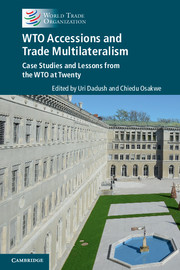Book contents
- Frontmatter
- Dedication
- Contents
- List of contributors
- Foreword
- Acknowledgements
- List of abbreviations
- Editors' note
- PART I WTO accessions, the trading system and the global economy
- PART II Overview: systemic outcomes from accessions
- PART III Members’ perspectives on accession negotiations
- PART IV Working party chairpersons’ perspectives on accession negotiations
- 25 Facilitating accessions: the role of the working party chairperson
- 26 A podium perspective: experiences and challenges of chairing a working party
- 27 Are there different rules for least-developed countries in a rule-based system?
- 28 Managing the challenge of acceding post-conflict states
- PART V Salient features inWTOAccession Protocols
- PART VI Conclusion
- Annex: Contributor biographies
- Index
- Plate section
27 - Are there different rules for least-developed countries in a rule-based system?
from PART IV - Working party chairpersons’ perspectives on accession negotiations
Published online by Cambridge University Press: 05 November 2015
- Frontmatter
- Dedication
- Contents
- List of contributors
- Foreword
- Acknowledgements
- List of abbreviations
- Editors' note
- PART I WTO accessions, the trading system and the global economy
- PART II Overview: systemic outcomes from accessions
- PART III Members’ perspectives on accession negotiations
- PART IV Working party chairpersons’ perspectives on accession negotiations
- 25 Facilitating accessions: the role of the working party chairperson
- 26 A podium perspective: experiences and challenges of chairing a working party
- 27 Are there different rules for least-developed countries in a rule-based system?
- 28 Managing the challenge of acceding post-conflict states
- PART V Salient features inWTOAccession Protocols
- PART VI Conclusion
- Annex: Contributor biographies
- Index
- Plate section
Summary
ABSTRACT
In July 2012, the WTO General Council agreed on a set of new and improved guidelines to facilitate and accelerate negotiations on the accession to the WTO of least-developed countries (LDCs). The process of acceding to the WTO is complex, time-consuming and resource-intensive for candidate countries, and for LDCs, which have limited institutional and administrative capacity, in particular. The WTO accession process is very much a political process, and requires countries to undertake far-reaching domestic reforms in order to be in a position to implement WTO rules from day one of membership, as well as to benefit from MFN market access from WTO members and vice versa. The prolonged accession process is designed to enable acceding LDCs (and others) to acquire the knowledge and expertise to negotiate not only the terms and conditions for their membership, but also to function as viable members of the rules-based system. This chapter examines the enhanced guidelines and asks whether the WTO needs to improve the procedures for the benefit of LDCs and of the WTO. It examines how the WTO accession process and procedures, as well as the scope of the reforms it requires, compare to EU considerations in the process of its enlargement, and argues that, while the enhanced LDC accession guidelines have made an important contribution, some additional steps may need to be contemplated in the future. However, before a further enhancement is contemplated, it must be understood that the accession process, and the substance of WTO accession negotiations, in all serious institutions, are based on a partnership. This is a fundamental lesson from all successfully completed accessions and enlargement processes. The process is neither unilateral nor automatic.
Least-developed countries (LDCs) and others, not original WTO members, which acceded to the WTO after 1995, were not WTO-compliant and did not meet the standards and requirements of membership when they applied for membership. However, the WTO and its members have recognised the particular challenges for LDCs. Special mechanisms for assisting LDCs in their efforts to develop the necessary capacities have been established. A set of guidelines was adopted in 2002 to facilitate the accession of LDCs. One essential feature of these guidelines was an invitation for members to exercise ‘restraint’ when negotiating commitments from LDCs on access to their markets.
- Type
- Chapter
- Information
- WTO Accessions and Trade MultilateralismCase Studies and Lessons from the WTO at Twenty, pp. 602 - 607Publisher: Cambridge University PressPrint publication year: 2015



